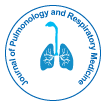Notre groupe organise plus de 3 000 séries de conférences Événements chaque année aux États-Unis, en Europe et en Europe. Asie avec le soutien de 1 000 autres Sociétés scientifiques et publie plus de 700 Open Access Revues qui contiennent plus de 50 000 personnalités éminentes, des scientifiques réputés en tant que membres du comité de rédaction.
Les revues en libre accès gagnent plus de lecteurs et de citations
700 revues et 15 000 000 de lecteurs Chaque revue attire plus de 25 000 lecteurs
Indexé dans
- ICMJE
Liens utiles
Revues en libre accès
Partager cette page
Abstrait
Advances in Pulmonology: New Treatments and Technologies for Respiratory Diseases
Alastair J Moore
Respiratory diseases, such as asthma, chronic obstructive pulmonary disease (COPD), and lung cancer, continue to be a significant health burden worldwide. However, recent advances in pulmonology have brought about new treatments and technologies that offer hope for patients suffering from these conditions. One significant breakthrough in pulmonology is the development of biologic therapies for severe asthma. These therapies target specific pathways that contribute to asthma symptoms, such as inflammation and airway constriction. Biologics have been shown to reduce the frequency and severity of asthma attacks and improve lung function in patients who do not respond to traditional asthma treatments.
Another promising development in pulmonology is the use of bronchial thermoplastics (BT) for severe asthma. BT involves the delivery of thermal energy to the airways, reducing the amount of smooth muscle in the bronchial walls and decreasing airway constriction. Studies have shown that BT can improve asthma symptoms and reduce the need for rescue medications. COPD is another respiratory disease that has benefited from advances in pulmonology. The introduction of new inhalers that combine multiple medications, such as long-acting beta-agonists and muscarinic antagonists, has improved symptom control and reduced exacerbations in patients with COPD. Additionally, newer medications that target specific pathways involved in COPD, such as phosphodiesterase-4 inhibitors, have shown promise in reducing inflammation and improving lung function.
Revues par sujet
- Agriculture et Aquaculture
- Biochimie
- Chimie
- Food & Nutrition
- Génétique et biologie moléculaire
- Géologie et sciences de la Terre
- Immunologie et microbiologie
- Ingénierie
- La science des matériaux
- Le physique
- Science générale
- Sciences cliniques
- Sciences environnementales
- Sciences médicales
- Sciences pharmaceutiques
- Sciences sociales et politiques
- Sciences vétérinaires
- Soins infirmiers et soins de santé
Revues cliniques et médicales
- Allaitement
- Anesthésiologie
- Biologie moléculaire
- Cardiologie
- Chirurgie
- Dentisterie
- Dermatologie
- Diabète et endocrinologie
- Gastro-entérologie
- Immunologie
- La génétique
- Maladies infectieuses
- Médecine
- Microbiologie
- Neurologie
- Oncologie
- Ophtalmologie
- Pédiatrie
- Recherche clinique
- Soins de santé
- Toxicologie

 English
English  Spanish
Spanish  Chinese
Chinese  Russian
Russian  German
German  Japanese
Japanese  Portuguese
Portuguese  Hindi
Hindi